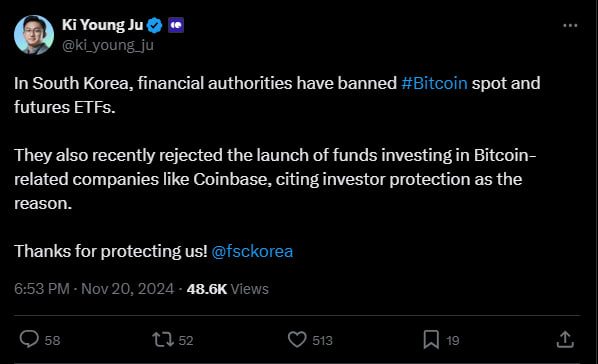- South Korea bans Bitcoin ETFs, citing investor safety, sparking regulatory criticism.
- International crypto ETF adoption rises as South Korea enforces stricter funding guidelines.
- Restrictive insurance policies could hinder South Korea’s function within the evolving digital asset market.
South Korea has saved its crypto laws in verify but once more when it banned Bitcoin spot and futures ETFs thereby blocking funds that put money into digital asset firms like Coinbase.
In line with Ki Younger Ju, Founder & CEO of CryptoQuant, these restrictions goal to guard traders, however critics argue they’re extreme and hinder the nation’s alignment with international traits in digital asset regulation.

Ban Extends Past Bitcoin to Digital Asset Firms
The Monetary Supervisory Service (FSS) not too long ago confirmed the rejection of ETFs concentrating on firms with digital asset-based enterprise fashions. Asset administration companies had deliberate to introduce ETFs specializing in companies like Coinbase, a number one cryptocurrency change.
Regardless of being prepared for fast launch, these funds failed to realize approval. Because of this, many home asset managers paused plans to submit related ETF purposes, intently watching the FSS’s actions.
The rejection is reportedly rooted in South Korea’s 2017 “Digital Foreign money Emergency Measures,” which prohibit monetary establishments from dealing in digital property. Whereas this administrative guideline goals to guard traders, it has confronted criticism for missing clear authorized backing, notably since companies like Coinbase are publicly traded and controlled by established monetary legal guidelines overseas.
International Tendencies Diverge from South Korea’s Method
Internationally, the regulatory atmosphere for cryptocurrency-linked investments is changing into extra accepting. As an illustration, the U.S. market launched leveraged ETFs tied to Coinbase in 2022.
These merchandise have achieved important buying and selling volumes, with latest each day exercise exceeding $1 trillion. Moreover, American exchanges now facilitate cryptocurrency spot ETFs and choices buying and selling, showcasing a stark distinction to South Korea’s restrictive insurance policies.
Learn additionally: South Korean Metropolis Seizes and Sells Crypto for Unpaid Taxes
By blocking investments in digital asset firms, South Korea dangers isolating itself from international developments in cryptocurrency regulation. Critics argue this method limits home traders’ alternatives to diversify their portfolios.
In addition they spotlight the inconsistency of making use of the 2017 pointers to publicly traded firms, suggesting it might hurt the nation’s aggressive edge within the digital asset market.
Disclaimer: The data introduced on this article is for informational and academic functions solely. The article doesn’t represent monetary recommendation or recommendation of any type. Coin Version is just not answerable for any losses incurred on account of the utilization of content material, merchandise, or providers talked about. Readers are suggested to train warning earlier than taking any motion associated to the corporate.

